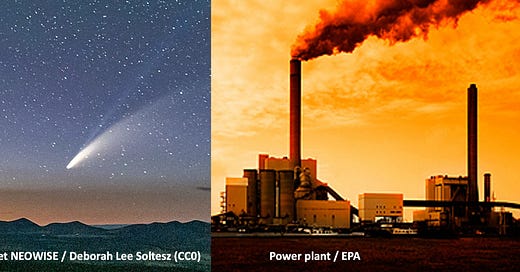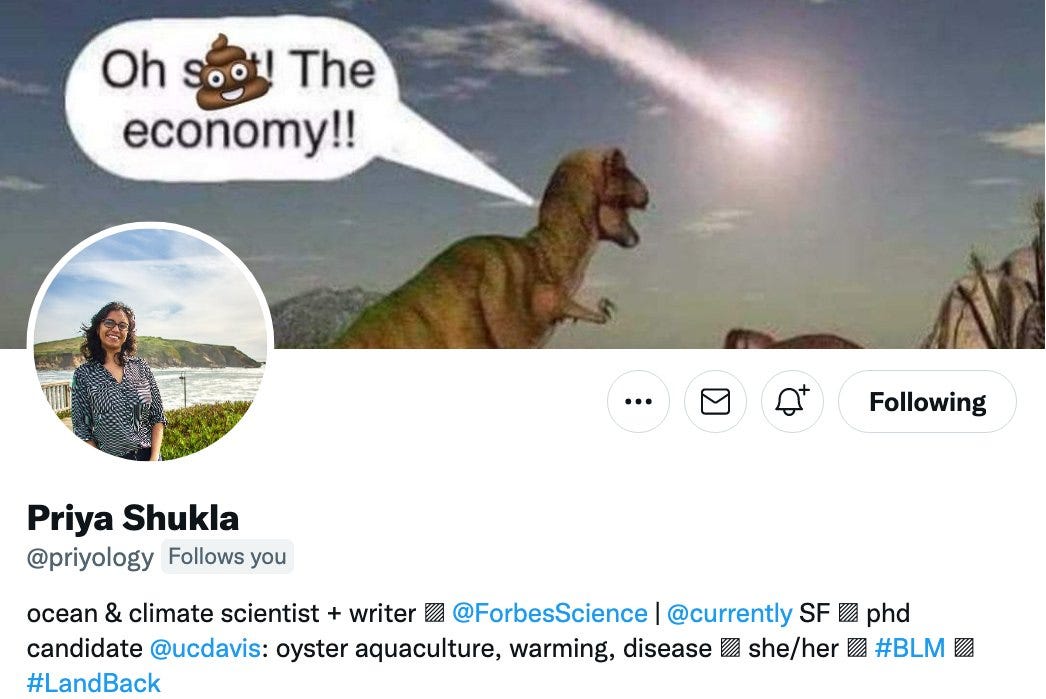Don't Look Now, But an Asteroid or Comet Catastrophe is Not Like the Climate Crisis
As Leonardo DiCaprio said, the best impact of "Don't Look Up" would be to spark a climate conversation. That is happening, big-time!
As I wrote earlier this month, I saw the darkly hilarious Netflix catastrophe comedy "Don't Look Up" at a screening including an onstage conversation with several of the stars, including Leonardo DiCaprio.
DiCaprio, who plays a Xanax-popping astronomer trying to get humanity to divert an earthbound comet, said this when asked what his hope was for the film, written and directed by Adam McKay:
That conversation is under way in a big way now, and it's worth highlighting some constructive counterpoint to the idea - pressed by the film's creative team and many climate campaigners - that a comet catastrophe is a suitable stand-in for human-driven climate change.
To start, I'll lay out my "priors" (a term epidemiologists and other risk analysts use to stake out their "prior knowledge and beliefs" about an issue before the evidence comes in).
First, I greatly enjoyed the film for what it is - a black-hole-dark satire peppered and streaked with everything from slapstick to heartache, hammering an array of bad guys - and even the good guys. It's a movie, folks.
Jennifer Lawrence plays Kate Dibiasky, an astronomy grad student who spots a comet that turns out to be a planet killer. (Netflix)
But as a "message" film, I see "Don't Look Up" cutting far more to the deepest most fundamental human weaknesses way more than revealing anything about the particular challenges posed by global warming.
Status quo bias (everything'll work out; read this paper) is a big one, especially when paired with short-termism (read this fine BBC piece) and what the sociologists Robert Brulle and Kari Norgaard call social inertia (paralysis when people confront foundational problems in society).
From this seminal paper on status-quo bias
Those weaknesses get exploited in the film by corporate and political power brokers and amplified by broken media and social media models, just as in real life these days.
As I wrote in my first story, "The monster in Adam McKay's apocalyptic film isn't the climate crisis, a comet collision, social media or corporate titans. It’s human nature and our big blind spot for bad news."
Here are three useful perspectives on the film and its basic premise, one from an astrobiologist who studies conditions fostering, or impeding, life on any planet, one from a doctoral candidate in climate and ocean science and another from a sociologist focused on pathways past climate inaction on our planet.
Point me to others you've found intriguing, illuminating, infuriating.
David Grinspoon
David Grinspoon at the University of Iowa (U. of Iowa photo)
Back on December 10, I reached out for thoughts on an incoming comet as a climate proxy to David Grinspoon, one of my favorite astrobiologists. I knew he must have thought about this and, sure enough, he sent a passage from his inspiring and illuminating 2016 book "Earth in Human Hands: Shaping Our Planet's Future." He gave me permission to post the excerpt here:
From "Earth in Human Hands":
"Some have likened climate change to an asteroid that is clearly heading for Earth. It’s a good analogy in some ways. Scientists are certain that it is heading our way, and we can probably avert it if we apply the right resources toward a solution. Even so, people are ignoring the warning and going about their business while the preventable nightmare hurtles toward us.
In some important respects, though, this is a bad analogy. Unlike the path of an asteroid, whose motion is determined by the relatively simple laws of gravitational mechanics, climate is horribly complex. We can’t predict the exact trajectory with perfect reliability. With an asteroid, we can tell you exactly when it’s going to hit, down to the day and even the minute, and roughly what will happen when it does. Once we’ve averted it, we can relax for a few more centuries until another one is spotted coming our way.
The asteroid will either hit us or it won’t. With climate, it’s not an either/or proposition. It’s a constantly shifting trajectory that will require sustained attention and concern over years, decades, and centuries. Clearly we are not going to shut down all the coal plants in the next ten years. I believe, just as clearly, that they will all be shut down by this century’s end. Between those two boundary conditions lies a huge range of possibilities.
Yes, we are putting ourselves at risk, and yes, we should do whatever we can to move ourselves as quickly as we can toward new energy systems. However, there is no critical moment at which the disaster hits or will be averted. There are, rather, accelerating and decelerating trends, and an infinite number of possible paths. It’s a slowly unfolding emergency that requires not a quick pulse of activity, not a fight‐or‐flight response, but long‐term engagement, enduring changes in the way we live, through a long series of thoughtful readjustments. We don’t need to panic or despair. We are in this for the long haul."
Priya Shukla
Priya Shukla, a Ph.D. candidate at the University of California, Davis, and Forbes columnist, wrote a valuable piece exploring the films themes and gaps, and what it felt like from the vantage point of a young scientist in a position similar to that of Kate Dibiasky, the Michigan State doctoral student who spots the planet-killing comet that ends up named for her.
She made an important point about how the film's U.S. centrism apart from some momentary sidenotes:
"Given that Don’t Look Up is the number one Netflix movie in every country, I was surprised that this movie was extremely U.S.-centric (with a predominantly white cast). There are brief nods to scientists in other countries and an international coalition attempting to destroy the comet without the U.S. But, for a climate change allegory, the disproportionate impacts of climate change on developing countries, poor communities, and people of color were not touched upon (other than maybe a running gag about overpriced shovels) and should be depicted. For a problem that requires collective action (be it comet or COVID or climate change), there needs to be more discussion about how to protect the most vulnerable members of the population."
Stefan C. Aykut
The University of Hamburg sociologist Stefan C. Aykut, who heads a team studying political dynamics around ecological crisis and conflicts, took to Twitter to lay out a different critique.
"'Listen to the science' is not an adequate political strategy"
Here are a few excerpts from Aykut's thread (with Twitter shorthand cleaned up):
"It’s a good film, sometimes hilarious & often painfully precise in depicting the self-referentiality of social systems, esp. politics & media. For a blockbuster, it also finds a reasonably good metaphor for the climate crisis, even though it’s not perfect.
But 'Don't Look Up' also reproduces some problematic views on the climate problem, which are characteristic for the current debate. These problematic views concern three aspects of the film: the framing of the problem, the question of agency, and the proposed solution.
(1) The problem: the asteroid is so big & apocalyptic that everything else disappears. Inequality, racism, relations of exploitation are secondary in the film. Yet, these are fundamental features of the climate crisis & central to understanding inaction.
(2) Agency: there is no society in the film, only individuals & elites. No organized groups, no parties, no trade unions, no social movements. When people act together, they are massified as violent mobs or indistinct cheering publics. Hence, collective action is impossible.
3) The solution: because there is no society & no collective agency, the only possible solution to the problem is technology. Here: nukes. For climate, the website of the film advocates for renewables & carbon capture. But technofixes alone won’t do."
Aykut makes an important point about a key theme in the movie - which is to listen to science. As I wrote in my earlier post, I've never heard a film reference the phrase "peer review" more frequently!
Here's how he gets at this:
"Climate policy is not a scientific, but a political problem.
'Listen to the science' is not an adequate political strategy, because there is not one, but many possible paths to climate neutrality. Applied to the film, this means the focus on on solution (‘nukes’) is misleading.
Climate is (just) one problem among others. It is very important, but there are other legitimate concerns. In the film, jobs and social justice are only distractions. In the real world, climate policy can only succeed when combined with other problems. Issue-linkage builds coalitions!
The fossil age rests on political-economic power relations. Climate politics is not about applying science, but about disrupting power & building coalitions. Every analysis of the problem needs to start with this societal complexity, not with a sole focus on decision-makers.
The transformation requires active societal involvement. Climate policy is not a one-shot decision (like nuking the asteroid), but a long-term strategy. In plural societies, the key is to harness societal agency, i.e. active involvement of citizens, groups, movements.
He points to a paper on which he is one of a dozen or so co-authors:
"It’s not enough to be right! The climate crisis, power, and the climate movement."
I urge you to read it!
UPDATE, 12/31, 5pm / And don't miss David Vetter's deep Forbes critique of a heap of negative reviews from what you might call #VSC's - very serious critics:
Resources
There's a heap of good discussion about the film on Twitter and elsewhere if you sift using the movie hashtag #DontLookUp and the word climate (yes, amid a lot of bomb throwing).
To see how climate scientists are finding themselves in this film, sift Twitter for "#dontlookup and climate scientist."
Via Twitter, I connected with David Sirota, the politics-focused journalist who founded the Daily Poster and sparked Adam McKay to write this film. He noted that one outcome of the success of this movie is it might prompt Hollywood to get more comfortable doing more films on climate themes. We're planning to get him on a Sustain What conversation in January! I encourage you to follow @davidsirota (and Adam McKay at @ghostpanther).
In a Sustain What conversation on "Don't Look Up," Amy Mainzer, the University of Arizona astronomy professor and planetary-defense pioneer who was the main science adviser to the filmmakers and cast, offered invaluable perspectives on the film's themes and how it handles the science-public-policy interface:
Here's a fun trailer for Grinspoon's Earth in Human Hands:
Help Build Sustain What
It's the end of the year as we knew it, and I'm hoping you can help steer my work here and build our Sustain What community for the tough years ahead.
Tell friends what I'm up to by sending an email here or forwarding this introductory post.
Thanks for commenting below or on Facebook.
Subscribe here free of charge if you haven't already. I'll be offering ways to help support my work financially but am committed to keeping the content open for those who need it most.
Send me feedback (including corrections!), tips, ideas here.
Parting Shot
Artists are using an amazing array of media to tackle the climate crisis and the wider "blah, blah, blah, bang" challenge humanity faces. One of my favorite pieces is a device in which a hammer monotonously taps on glass. it's by a Hudson Valley neighbor, John Allen. He told me he hung it in his kitchen before putting it in a show to see if he ended up ignoring the sound.










